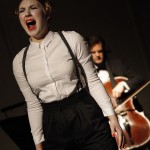By Rebecca Schmid
Experimental Regie, free from the scrutiny of finicky patrons on the German opera scene, can in the best case scenario serve to illuminate hidden meanings of a score. In the worst case, it can drown out or obscure musical considerations. The Staatsoper Berlin’s Werkstatt (‘workshop’), a wing of the company’s temporary residence in the Schiller Theater dedicated to new music theater (the literal translation of Musiktheater, which in effect places music and theater on equal turf), is currently showing Salvatore Sciarrino’s Vanitas (1981), designated by the composer as a ‘still life in one act.’ A trio for soprano, cello and piano, the work—seen at its second run on March 19—comes closest to a mini cantata with its intricate exchanges. A winding, descending melody provides a Leitmotif of angst and emptiness for the soprano, echoed by the ghostly cello, while the piano interjects with a bed of shifting harmonies. The text, woven together from fragments by German, Italian and other poets, lingers existentially over a wilting rose—an image hovering on the boundary between life and death.
In a new staging by Götz Friedrich protégé Beate Baron, the notion of a still life is taken literally when an elderly couple (Hans Hirschmüller and Friederike Frerichs) stands motionless before the audience, the sequins on their aristocratic clothes sparkling as they exude an admonishing stare. The soprano (Rowan Hellier) is trapped in her own surreal world—hair pinned up above doll-like make-up when she emerges from a corridor drowned in white light. As the drama escalates with frenetic passages in the piano (Jenny Kim), scrims descend to provide close-ups of the elderly couple—larger than life yet a bold distraction from the searching emptiness of the music. The actors, still onstage, resemble negligent, upper crust parents as they observe Hellier writhe on the floor in a moment of insanity. Her agility was impressive, but certain positions naturally compromised vocal production. I found myself drawn to the skilful playing of cellist Gregor Fuhrmann as his bow hovered with eerie tones above the bridge. Grating and creaking accompanied Hellier’s silent scream as the lights faded to darkness—a moment which allowed for full immersion in the music.
Ultimately, one was left wanting more. Perhaps it would have made sense to juxtapose the work with another one-acter—maybe even a world premiere culled from the extensive pool of Berlin-based composers—and pare back the staging? Two seasons ago, the company mounted Sciarrino’s Infinito Nero (1998) alongside Peter Maxwell Davies’ Miss Donnithorne’s Maggot (1974). Davies received an installation with live video that culminated in attempted suicide and a still birth, but in this case the protagonist is an abandoned bride who, according to the 19th-century story, actually does go insane. For Sciarrino’s ‘ecstasy in one act’ evoking the mystical experiences of Maria Maddalena de’Pazzi, the soprano Sarah Maria Sun was duct-taped to a cross that was hung from the ceiling. The concept was at first captivating—not to mention a technical feat—but quickly lost traction when extras crawled around with dildos stuck in their flies and splattered Sun with blue paint. The score’s hollow, breathing winds and haunted outbursts were reduced to spiritual relics—which is ironic given the Werkstatt’s focus on new music. The institution deserves credit for its sense of adventure, but the future of Musiktheater may depend on an awareness that theater must serve the interests of music—not the other way around.
